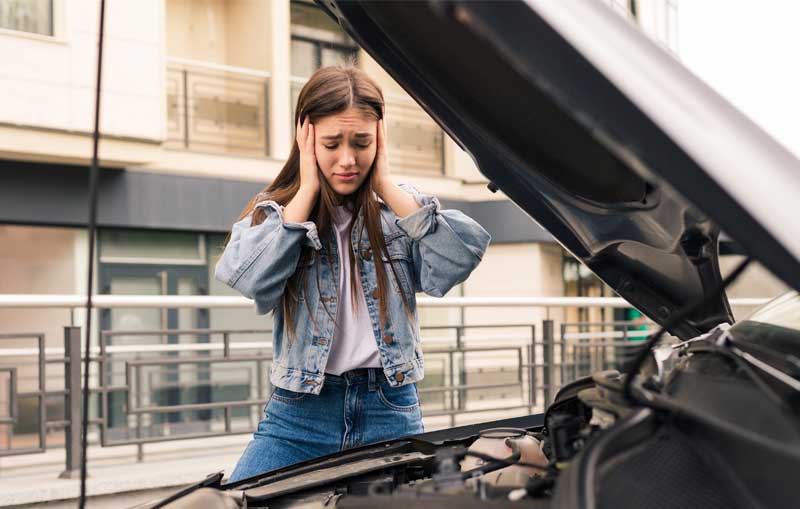When the honeymoon phase of your car is over, it’s only a matter of time before you breakup and start your search for a car that better fits your needs. Rather than wait until you’re left stranded by the side of road in need of a tow truck, car shopping now will prepare you for what is just around the corner.
Car experts typically advise people to trade in a first-owned vehicle soon after the car loan is paid off. The trade-in value typically remains relatively high, allowing you to get the most money towards your next purchase. If you own a used vehicle, car shopping before a car, truck, or SUV ages helps to avoid mounting expenses. Whether you just paid off a car loan or own a failing late-model vehicle, it may be time to embrace that new car smell.
Signs It’s Time to Go Car Shopping for A New Ride
People have a way of sticking with familiar things even though we know in our hearts something isn’t working. A once comfortable chair that has seen better days, a mattress that now leaves you with a backache, or those boxes of outdated items cluttering your garage often linger too long because letting go sometimes proves difficult. But after a day of car shopping, most of us can visualize the benefits of trading up. If you’re experiencing any of the following telltale signs, it’s time for a new ride.
1. Repairs Are Adding Up
The average cost of automobile maintenance hovers around $66 per month, according to AAA. Owners of new vehicles and those under warranty rarely exceed this figure. Dealerships may even offer no-cost or discounted maintenance packages with a purchase. By contrast, aging vehicles that are no longer under warranty tend to strain family budgets.
Late-model vehicles can cost upwards of $100 per month. More frequent maintenance on items such as batteries, windshield wipers, tires, and electronic systems adds up. On top of that, the average cost of car repairs runs approximately $1,000 per year and continues to climb year after year. Time and mileage result in car owners spending more than the annual average.
Each time repairs are made, owners breathe a sigh of relief, thinking they won’t have to dip into their savings in the near future. But driving an aging vehicle becomes something of a slippery slope. Repair after repair, that once prized vehicle becomes a money pit.
2. The Car is Failing Emissions Tests
Failing an emissions test sets off a series of issues that can haunt an automobile owner. The initial problem is that your vehicle will not pass inspection and that puts you at risk. Driving an uninspected vehicle in Georgia or South Carolina can result in a citation and fine. Considered a moving violation, the driver’s record will incur a blemish, and your automobile insurance may increase.
Along with producing excessively harmful emissions, the vehicle will require expensive repairs to correct the issue. These may include a new catalytic converter, a complete exhaust system, updated sensors, or significant engine repairs. Should the vehicle fail an emissions test a second time, owners can only secure a repair waiver after spending the maximum amount of money the state requires.
3. Spare Parts Are Costly or Unavailable
It’s important to understand that car manufacturers do not necessarily produce replacement parts forever. When models are discontinued, the clock may start ticking on parts. People with older vehicles may be tasked with tracking down replacement parts by personally calling dealerships, and junkyards, or scouring online at sites such as eBay. If you’re fortunate enough to find a used part, expect to overpay for an item with diminished life expectancy.
Although cars and trucks may possess nostalgic value, in terms of getting to work or keeping appointments, one breakdown could sideline that once gem of a vehicle indefinitely. Better to go car shopping before calling friends, family members, or Uber becomes a necessity.

4. You Are Spending More On Gas
While gasoline and diesel are relatively inexpensive, drivers generally don’t give the price at the pump a second thought. But spikes in recent years have more than a few commuters rethinking fuel efficiency.
Issues such as old spark plugs, faulty sensors, outdated motor oil, straining air conditioning units, and off-kilter fuel injectors, among others, contribute to poor gas mileage. But truth be told, many older vehicles were simply not designed to provide the increased fuel efficiency of newer models. Government regulations are tasking automakers with creating more energy-efficient vehicles at a time when hybrids and EVs are rolling off assembly lines. Fuel economy breakthroughs are an excellent reason to go car shopping right now.
5. Your Lifestyle Has Changed
The joy of driving a stylish automobile will give way to favoring practicality at some point. Homeownership, marriage, and a growing family change the equation of what drivers are looking for in a vehicle. Two youngsters, a dog, and a youth sports equal minivan, SUV, or other type of sizeable family vehicle.
Beyond having a vehicle that can accommodate the entire family, safety and technology often emerge as important features. Front seat airbags remain a danger for small children, which means the young ones may all need to fit in the rear.
It’s not uncommon for pickup truck and small vehicle owners to go car shopping for a three-row SUV. These convenient passenger vehicles offer enough room for everyone to travel safely and provide electronic device plugs throughout. Given that SUVs fit everyone comfortably while providing enough space for travel accessories, car shopping for an upgraded model is a positive lifestyle change.
6. When The Weather Changes The Performance
Engines are usually designed to handle temperature fluctuations. But Georgia and South Carolina’s summer heat can place an inordinate amount of pressure on a vehicle’s system. Rubbing hoses and elements can be put to the test when the temperature is near or exceeds 100 degrees. Many drivers may not even realize that motor oil generally thins under extreme conditions, placing the engine at risk.
Year after year, exposure to extreme heat can wear down any product, even an otherwise reliable car. If the weather seems to impact the way your vehicle handles or if your radiator has overheated in the past, it may be wise to go car shopping and trade in your car before you’re left stranded.
7. When You No Longer Feel Safe
Given the beautiful landscapes around Oregon, driving should be a pleasant experience. But if you feel your vehicle may have safety issues, driving can be stressful. There’s no reason you should have to hold your breath and worry about a breakdown or collision when traveling to work or a family get-together. You deserve a safe vehicle to get you from one destination to the next. A new or “new to you” pre-owned vehicle accomplishes that goal.
Before You Start Car Shopping, Get Pre-Approved for Your Car Loan
If you’re experiencing the telltale signs that you might need a new vehicle, consider getting pre-approved for a car loan before going car shopping. Working with a trusted local lender lets you know precisely how much buying power you possess before walking dealership lots or searching online.
CCCU is always here to help! Stop by your local branch, complete an online car loan application.



